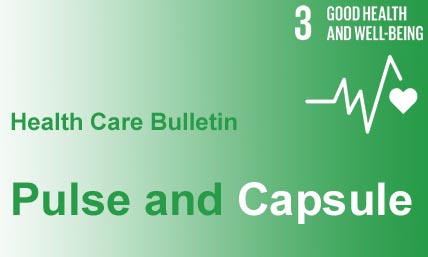
Project Bulletins
Pulse and Capsule – Volume 01, Issue 01
Editorial Comments

Consultant
COVID-19 pandemic can accelerate technology adoption in Healthcare systems
COVID-19 pandemic has presented an unprecedented situation before the governments, healthcare systems, policy makers, businesses and individuals to spur urgent decision making through new ideas. The situation demanded agile methods to predict the number of positive cases on a daily basis to fast-track tracing, testing and providing necessary care. This led to innovative dashboards and smartphone applications being developed and used by local governments, universities, not for profits, think tanks for geo-spatial mapping of health institutions, laboratories, mapping of positive cases in localities; the open availability of data in public domain, live tracking of daily cases is termed as “information pandemic” COVID-19 has accelerated the use of newer technologies. Artificial Intelligence, Machine Learning platforms were used to draw prediction models, develop diagnostic tools and expound risk predictor algorithms.
Personal identifier delinked datasets were made available to researchers across the world. The availability of data in the public domain collated through the dashboards from multiple sources led to better accessibility of data for the researchers. Researchers in Israel used radiographs of diagnosed COVID-19 cases to develop Machine learning based, clinical decision support system to detect COVID-19 from chest radiographs scanned using smartphones by para medical worker or even a lay person. The dataset used for training the algorithm was made available in Public Domain.
India also experienced sudden rise of dashboards, applications to track COVID-19 cases, dashboards to locate hospitals with empty beds and laboratory with testing capacity. The Government of India, promoted and in some instances regularised the download and usage of “AarogyaSetu” application to track COVID-19 related symptoms.
The use of advanced technological innovations and applications, are not new in the healthcare systems. There are validated risk assessment tools available for a range of diseases like Diabetes, Hypertension, Cardio Vascular Diseases and also for Mental Health. Clinical decision support systems to detect early signs of oral cancer are available commercially and many were developed and validated for range of cancers. Clinical, Diagnostics, data sets used for development, validation was made available to researchers upon request.
However, all these technologies were limited to research settings. There was a lack of interest shown by the governments, healthcare systems and individuals in adopting these technologies. Information Education and Communication for use of digital health solutions was extremely rare. Many technologies were abandoned due to lack of funding and lack of user base.
COVID-19 has helped in leveraging technological solutions in healthcare settings along with increased user base and funding opportunities and forced governments to legislate the usage of technology. The COVID era has created an enabling and favourable climate for technologists, medical professionals, digital health researchers to accelerate the use of technology in healthcare systems.
In India, digital health solutions face roadblocks due to lack of digitalized data, lack of integrated datasets, limited digital literacy, limited motivation of medical professionals and limited push from government and regulatory bodies. COVID19 has ironed out many of these road blocks Looking forward, there is a greater need to create a robust framework to institutionalize digital solutions in public health systems through these mechanisms:
- Promote the development for a comprehensive digital health policy
- Advocate for the implementation of a National Health Stack (An online portal for all health data owned by individual citizen)
- Develop national registry of digital health solutions to promote research and single platform archive of technology and data sets.
Stakeholder Interview

Professor and Founder Head of the Centre for Spatial Information Technology (CSIT) at Jawaharlal Nehru Technological University, Dr Raja Ramanna DRDO Distinguished Fellow
Q: COVID-19 pandemic is an unpredictable situation and what way the technology has been extensively used during this situation?
A: Yes, the pandemic is an unpredictable situation. Geospatial and statistical tools, AI/ML technologies and Internet of Things (IoT) have been used as supportive technologies, in varying degrees of proportion in identifying the high-risk localities, predicting the temporal and spatial spread of the disease during the current pandemic erratic situation. The efforts have provided a good amount of tacit knowledge and challenges for validation of the epidemiological/ predictive models.
Q: How do you see the feasibility of mainstreaming the use of AI/ML and big data technology for Non-Communicable diseases in the near future?
A: While talking about mainstreaming AI technology, the primary datum one should appreciate is, that AI is a constellation of technologies enabling machines to act with better intensities of intelligence and tracking the data provided for learning. In case of healthcare, learning spans the full spectrum of human experiences, observations, sense and understanding. This clearly facilitates elevated patient care, from drug discovery to clinical trials, treatment adherence and remote monitoring. To mainstream the use of AI, two important traits need to be
signposted. The first one is large scale corroboration of AI technology utilisation for operational application in health care which is to be taken up in mission mode. The second trait is that doctors, nurses, and other healthcare professionals must get-to-grips with AI and its many subsets and all their apprehensions fixed.
Q: Has COVID-19 accelerated adaptation of technology in healthcare?
A: Yes, certainly there are so many transformations happening today at scale that were just pilot thoughts three or four months back. From tele-healthcare solutions to contactless monitoring systems and smartphone health applications, all are playing a vital role in the war against COVID-19. I find that non-contact patient monitoring technologies are moving towards the use of video and sound analysis and mobile-based platforms incorporating advanced technologies such as AI/ML and Big data algorithms.
Q: Data generated from healthcare systems is usually restricted to physicians, many records are not digitised, large datasets are not integrated, this has been a major roadblock for implementing AI/ML and Big data tools. How can these problems be overcome?
A: Concerns about privacy are paramount in the application of individual health data. At the same time, researchers need to be able to use sensitive data appropriately to develop new insights, diagnostic methods, and treatments. This is a dichotomy. While, the usage of the health data available as analog records or in digital form is governed by government rules, other data types like IoT data are only regulated through “terms of service” agreements developed mostly by private sectors. So, the facilitators or partners will need to ensure that sensitive information is not disclosed or misused when these data sources are applied. One short way is to develop a licensing system for controlled access to sensitive health data. In addition to this, to protect privacy, health data should be de-identified in diverse ways before researchers analyse it. Data scientists, for example, have utilised codes that make it possible to link data on an individual from different sources without revealing the person’s identity.
Q: What policy changes are required to enable open access to epidemiological data in India? How has the COVID-19 pandemic highlighted the need for policy changes for healthcare data sharing?
A: Open access enablement of epidemiological data is a primary requirement to either plan interventions during pandemic emergencies or to promote research and development. For this enablement, issues on data privacy stand on top of the agenda, apart from concerns on data standards. Web portals are the main gateways to publish, share and collect epidemiological data as required during emerging pandemics to best monitor and anticipate spread of infection. Epidemiological studies investigate overall, average effects within populations, but clinicians many times need information about specific risks and benefits faced by the individual patients consulting the. So this is the issue of data standards and granularity. There is a definite urgency for implementation of a state-of-the-art technology-based epidemiological data sharing and accessibility policy in terms of data format and spatial and temporal granularity. Non-standard epidemiological data is of no use to clinicians or data analysts. Few standards exist with reference to observational studies or in clinical research. Data standards are to be prescribed for the collection and presentation of epidemiological data. One should remember that the AI application requirements are very stringent in terms of data standards.
Project Update
PAC is working on three health projects with the Department of Health and Family Welfare and AYUSH Services. The Inception Reports for the three projects are completed. These reports include a comprehensive literature review to understand the working of the healthcare system in Karnataka and other states as well, findings from stakeholder interviews, field visits, and secondary data analysis. The reports are in the process of finalisation in PAC for submission to the Department.
Conceptualised & Designed by

Published by


